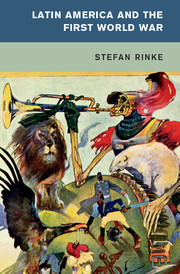Book contents
- Frontmatter
- Contents
- List of Figures
- Preface
- List of Abbreviations
- Introduction
- 1 The Global Context before 1914
- 2 Neutrality under Pressure, 1914-1917
- 3 In the Wake of War, 1917
- 4 Turbulent Paths into a “New Era,” 1918-1919
- 5 The Demise of a World
- 6 Nation and Trans-nation
- Epilogue: The Global Legacy of the World War
- Sources and Literature
- Chronology
- Index
1 - The Global Context before 1914
Published online by Cambridge University Press: 09 March 2017
- Frontmatter
- Contents
- List of Figures
- Preface
- List of Abbreviations
- Introduction
- 1 The Global Context before 1914
- 2 Neutrality under Pressure, 1914-1917
- 3 In the Wake of War, 1917
- 4 Turbulent Paths into a “New Era,” 1918-1919
- 5 The Demise of a World
- 6 Nation and Trans-nation
- Epilogue: The Global Legacy of the World War
- Sources and Literature
- Chronology
- Index
Summary
With only a few exceptions, the former Spanish and Portuguese colonies in America reached their independence in the first third of the nineteenth century. The Latin American wars of independence marked the end of the series of the Atlantic revolutions that had begun with the revolt of the colonists in New England. They were closely tied to these events, as well as to those initiated by the French Revolution and the developments that came on the heels of the Napoleonic expansion in Europe. The independent republics remained intimately involved with this Atlantic context, which contained new opportunities, but also new risks and dependencies. In Latin America's long nineteenth century, it remained the most important reference point for the integration of the region into the global context.
During this period, the now formally independent successor states of the Iberian colonial empire faced numerous challenges. Throughout the entire region, the absence of functioning state institutions, the continuation of internal power struggles, the militarization of public life, and the rise of caudillos were among the most difficult obstacles that had to be overcome on the path toward stability. The difficulties of state formation were due not least to the skepticism about a political system that had failed to adequately explain who the new sovereign was. Officially, the concern was with the formation of democracies, and yet it remained unclear as to who belonged to the demos, the “constitutive people.” Not wanting to run the risk of inciting social upheaval, the new elites defined this more broadly or narrowly according to their own interests. While the rhetoric espoused universal values, day-to-day practice nonetheless remained socially discriminatory. In the ethnically heterogeneous societies of Latin America, where the non-white populations presented a clear majority, the gap between the language of liberty and equality and the social reality was significant. The challenging state of affairs the early republics faced was also related to developments that took shape outside of the region.
FROM COLONIES TO INDEPENDENT STATES
The Americas belonged, at least in theory, to the monopoly the Spanish and Portuguese crowns had held since 1494. While the advances of European rivals had contested this claim since the fifteenth century, the claim remained, despite the fact that the British, French, and Dutch settlements established in the Caribbean and elsewhere caused reality to look quite different.
- Type
- Chapter
- Information
- Latin America and the First World War , pp. 14 - 37Publisher: Cambridge University PressPrint publication year: 2017

